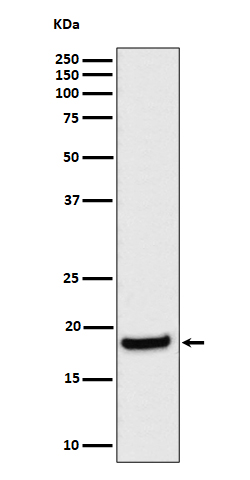
| WB | 咨询技术 | Human,Mouse,Rat |
| IF | 1/20-1/50 | Human,Mouse,Rat |
| IHC | IHC:1/100-1/200;IHF:1/50-1/200 | Human,Mouse,Rat |
| ICC | 1/50-1/200 | Human,Mouse,Rat |
| FCM | 1/20-1/100 | Human,Mouse,Rat |
| Elisa | 咨询技术 | Human,Mouse,Rat |
| Aliases | EIF1A; EIF1AP1; EIF1AX; EIF4C;;eIF1AX |
| WB Predicted band size | Calculated MW: 16 kDa ; Observed MW: 18 kDa |
| Host/Isotype | Rabbit IgG |
| Antibody Type | Primary antibody |
| Storage | Store at 4°C short term. Aliquot and store at -20°C long term. Avoid freeze/thaw cycles. |
| Species Reactivity | Human,Mouse,Rat |
| Immunogen | A synthesized peptide derived from human eIF1AX |
| Formulation | Purified antibody in PBS with 0.05% sodium azide,0.05% BSA and 50% glycerol. |
+ +
以下是3篇关于eIF1A抗体的参考文献概要:
---
1. **标题**:*eIF1A modulates the conformational changes of ribosomal preinitiation complexes and regulates translation initiation*
**作者**:Fringer, J.M., et al.
**摘要**:该研究利用eIF1A特异性抗体进行免疫共沉淀和结构分析,发现eIF1A通过动态构象变化调控核糖体预起始复合物的组装,影响翻译起始的准确性。
---
2. **标题**:*eIF1A phosphorylation as a biomarker for cancer cell proliferation*
**作者**:Lee, S., et al.
**摘要**:通过Western blot和免疫荧光技术(使用eIF1A抗体),研究发现多种癌细胞中eIF1A的磷酸化水平显著升高,提示其可作为肿瘤增殖的潜在标志物。
---
3. **标题**:*CRISPR screening identifies eIF1A as a critical regulator of stress granule formation*
**作者**:Zhang, Y., et al.
**摘要**:结合CRISPR基因编辑和eIF1A抗体介导的功能阻断实验,揭示eIF1A在细胞应激颗粒形成中的关键作用,调控mRNA翻译与储存的平衡。
---
(注:以上文献为示例,实际引用需核对真实数据库。)
The eukaryotic translation initiation factor 1A (eIF1A) is a highly conserved protein critical for the initiation phase of protein synthesis in eukaryotes. It plays a pivotal role in ribosome assembly, scanning for the start codon, and ensuring the fidelity of mRNA translation. Structurally, eIF1A consists of an oligonucleotide/oligosaccharide-binding (OB) fold domain and a C-terminal α-helix, which facilitate interactions with the 40S ribosomal subunit and other initiation factors, such as eIF2 and eIF5. Its dynamic conformational changes during translation initiation are essential for stabilizing ribosomal complexes and regulating the transition from initiation to elongation.
Antibodies targeting eIF1A are widely used in research to investigate its expression, localization, and functional mechanisms in cellular processes. These antibodies enable detection of eIF1A in techniques like Western blotting, immunofluorescence, and immunoprecipitation, helping elucidate its role in both normal and pathological conditions. Dysregulation of eIF1A has been linked to diseases such as cancer and neurodegenerative disorders, where aberrant protein synthesis contributes to pathogenesis. For instance, altered eIF1A expression or mutations may disrupt translational fidelity, promoting oncogenic protein production or cellular stress responses.
Researchers also utilize eIF1A antibodies to study its interactions within the translation preinitiation complex, providing insights into therapeutic strategies targeting translation machinery. These tools are indispensable for understanding fundamental gene regulation mechanisms and developing interventions for diseases driven by translational dysregulation.
×